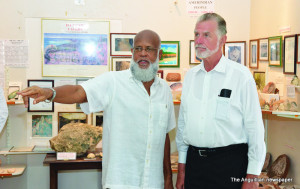
“Study your history and keep treasuring it,” is the message that Ambassador of the Federal Republic of Germany, Dr. Lutz Gorgens, left for the people of Anguilla after visiting Heritage Collection Museum at East End.
His tour of the museum on Monday, June 22, where Mr. Colville Petty OBE, is the owner and curator, was his second stop on leaving La Vue Boutique Inn, his place of accommodation, since his arrival in Anguilla on Sunday, June 21, for about a 24-hour stay.
Based in Port of Spain, Trinidad, Dr. Gorgens is the German Consul General for Anguilla, the British Virgin Islands and Montserrat. On a wider basis, he serves as Ambassador to all the other CARICOM and OECS territories. He arrived in Anguilla for his first visit via St. Maarten.
The holder of a PhD in History and Literature, Dr. Gorgens was fascinated with the history of Anguilla and the neighbouring islands.
“The history of the Caribbean area is incredibly rich,” he remarked to The Anguillian at Heritage Collection Museum. “I have just come from St. Maarten where one part [St. Martin] is part of France and part of the European Union. The other part is the Dutch administered by local people and the Netherlands, but it is not part of the European Union.
“Here in Anguilla, we have a country where the Chief Minister is elected by the population, but the Governor is British, appointed by the Queen; and I am here in my function as the German Consul General. I am also given permission by the Queen to exercise this office. My Ambassador in London wrote to Her Majesty the Queen and asked her to approve my being the German Consul General looking after Germans’ interest here – there are not many Germans living on Anguilla, but there are a few.
“Here at this museum I am honoured to talk with [Mr. Petty] one of the co-authors of the book about the Anguilla Revolution and I look forward to reading it. The big merit of that Revolution is that it was bloodless like the German Revolution 25 years ago.”
Dr. Gorgens said the book – Anguilla’s Battle For Freedom 1967-1969 – had captured the history of the island which was of much interest to him. “The Government suggested that I include a visit to the museum in my itinerary before I talk to the Governor and the Chief Minister,” he stated.
He was delighted to have visited the museum and to see the many artifacts there including a room featuring the Anguilla Revolution. “This might be your most significant room,” he commented to Mr. Petty.
Speaking from the perspective of his PhD in History and Literature, he told The Anguillian: “I developed an interest in history as a very young man. I think we can understand present-day politics and present-day living conditions much better when we know something about the past and how all of this came about.”
Asked what advice he would give to Anguillians, he replied: “I tell it to my children and all young people around the world: study your history. If you have finished doing so, study also the history of other countries; but you have to start with your own history and keep treasuring it.”
The German Ambassador not only visited the museum for a peak into Anguilla’s history, but purchased the book Anguilla’s Battle for Freedom 1967 -1969 – a compilation of the island’s most important period of modern history – for his own information.








